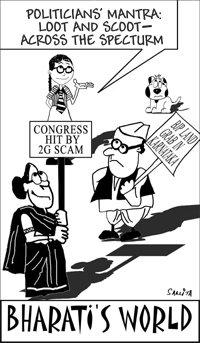In Uttar Pradesh — India’s most populous state (pop. 190 million) which also hosts 20 percent of the country’s 150 million-strong minority Muslim community — the Uttar Pradesh Urdu Academy (UPUA), a premier body for the promotion and propagation of Urdu, has become the target of intense criticism. In August Munnawar Rana, a renowned Kolkata-based Urdu poet, made a comment to the effect that the academy had done little for promotion of the Urdu language. This utterance has triggered a huge controversy in the Urdu language press in UP with loud demands for closure of the academy.
The academy’s secretary Syed Amjad Hussain dismisses these demands as “the ravings of disgruntled elements”. “We are running coaching centres in 25 cities and offer scholarships worth Rs.40 lakh to deserving candidates of both sexes from class VI to Ph D in schools and colleges where Urdu is being taught. Moreover we offer grants-in-aid to deserving Urdu authors for getting their work published, run a computer centre affiliated to the Department of Electronics and Accreditation of Computer Classes on the academy premises in addition to a calligraphy school and a sales depot which sells more than 500 academic titles. We also offer monetary help to deserving but poor Urdu poets and writers,” he says.
 UPUA, the first of such academies countrywide, was promoted in 1972. Its mandate is inter alia, the promotion and propagation of Urdu; publication of children’s literature; editing and publishing of ancient and rare manuscripts; grant of scholar-ships to deserving students; conferring awards upon Urdu poets and litterateurs and helping writers and poets publish their work.
UPUA, the first of such academies countrywide, was promoted in 1972. Its mandate is inter alia, the promotion and propagation of Urdu; publication of children’s literature; editing and publishing of ancient and rare manuscripts; grant of scholar-ships to deserving students; conferring awards upon Urdu poets and litterateurs and helping writers and poets publish their work.
Yet this multiplicity of duties doesn’t impress Prof. A.R. Fatihi who heads the department of linguistics at Aligarh Muslim University. While conceding that the academy has a vital role to play in the development of Urdu, Fatihi believes this cannot be done only through organisation of seminars, mushairas and doling out awards. “Excessive attention is being paid to development of literature when there should be sociological research on issues such as the profile of those interested in learning Urdu, planning for learning at different levels, and the type of texts being prescribed. At the same time, attention should be paid to the fact that the language is regularly used in administration, especially in the courts, yet there isn’t one dictionary which to my knowledge has been developed by the academy which could be of help to the layman,” says Fatihi.
Prof. Malik Zada Manzoor Ahmad, former head of the Urdu department at Lucknow University and former president of the UPUA, the executive committee of which he has been a member ever since it was formed, also attributes the rising tide of criticism to disgruntled elements. “It is the undes-erving who are behind the smear campaign against the academy. These are the people who flood the Urdu press with critical letters to the editor. But it’s a fact that the larger grants of recent years have done wonders for the functioning of the academy. During my presidency the annual grant was Rs.1 crore of which Rs.80 lakh was spent on salaries,” he says.
But even though the academy’s annual grant from the state government has been increased to Rs.3 crore, it isn’t sufficient to fund plans to digitise its collection of 450 rare manuscripts, or start a long-pending adult education scheme and a course in Urdu journalism on its one acre-campus spread across Lucknow’s upscale Gomtinagar area. Prof. Anis Ashfaq Abidi, professor and head of the department of Urdu, Lucknow University believes that more efficient administration and a broader agenda is required to improve the profile of the Uttar Pradesh Urdu Academy. “For years the academy has not organised a single national or international seminar or programme. In my opinion, only the Delhi Urdu Academy has fulfilled its mandate to the fullest,” says Abidi.
The silver lining of the often bitter debate in the media and public platforms over the aims and objectives and alleged lapses of UPUA is that it has brought the academy and the status of Urdu in India’s most populous state with the largest Muslim community into sharp focus, which is good news for the latter even if not the academy.
Vidya Pandit (Lucknow)